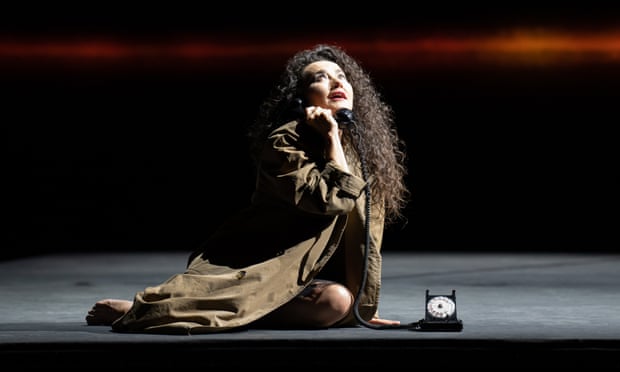Heartbreak and farce collide in Glyndebourne’s final production of the season, a double bill of Poulenc’s two one-acters – La Voix Humaine and Les Mamelles de Tirésias – directed by Laurent Pelly and conducted by Robin Ticciati. Both, in their very different ways, examine themes of sexuality and desire.
The “tragédie lyrique” La Voix Humaine (1959) depicts a desperate phone conversation between a possibly suicidal woman, simply called Elle (“She”), and the unseen, unheard lover who is dumping her for someone else. Les Mamelles de Tirésias (1947) is its polar opposite: a glorious if at times surreally bonkers comedy, way ahead of its time in its treatment of gender stereotyping and gender reversal, in which feminist Thérèse suddenly becomes a man and heads out into male-dominated society, leaving her bewildered husband at home to make babies (40,049 of them, we are told) on his own, through “willpower”.
Pelly wisely avoids any attempt to link them through glosses or recurrent imagery, though both productions are to some extent rooted in visual abstraction. La Voix Humaine begins with Stéphanie d’Oustrac’s Elle clutching her phone in a simple pool of light. As her uncertainty grows, the floor literally begins to shift beneath her. Black drapes and screens alternately hem her in and set her free, and a glaring red streak on a dark backcloth gradually fades as hope dies. Some of it is too busy, though d’Oustrac, a great artist, gives a devastating performance, drawing us into Elle’s emotional hell while making us aware of the self-pity and manipulative calculation that also drive her on. Ticciati is excellent here, too: there is plenty of passionate, full-blooded playing from the London Philharmonic Orchestra.

Les Mamelles de Tirésias, meanwhile, is among the most difficult of operas to stage, though Pelly manages it wonderfully well. He sets it in a white-box “dream space” where we find Elsa Benoit’s Thérèse and Régis Mengus as “the Husband” having their first marital spat in bed. Things soon become laugh-out-loud funny as Thérèse’s breasts fly away and explode, the Husband dons his wife’s corsets and gets picked up by a policeman (Gyula Orendt), and a combination of singers and puppetry hilariously conjures up the vast brood of children. Benoit and the exceptional Mengus head a superb ensemble of largely French-speaking singers, every one of whom is outstanding. And Ticciati has great fun with a score that at its best rivals Offenbach in its brilliance and wit.

